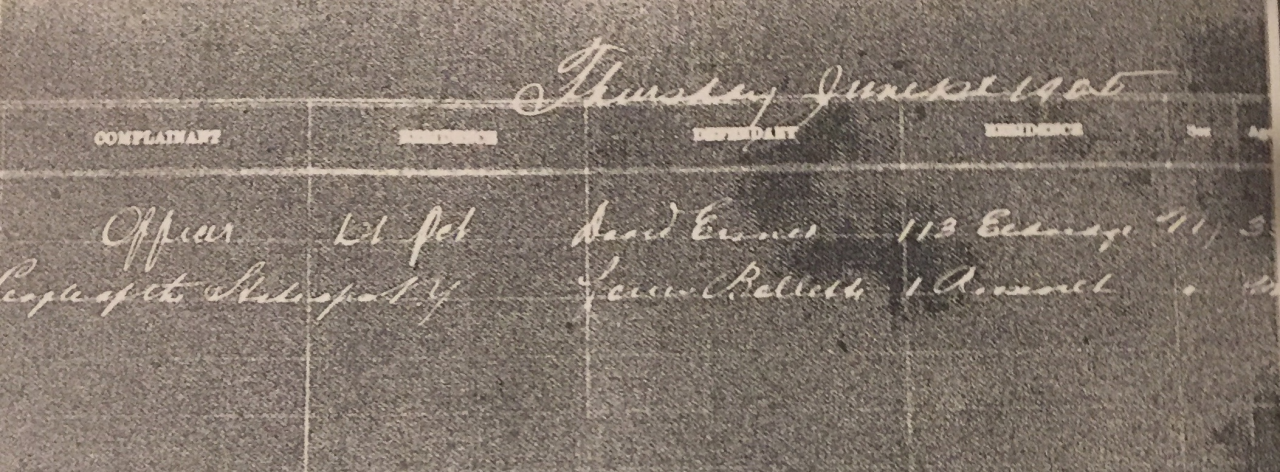During the newsboy strike there were rumors that the former rivals of the New York World and New York Journal had come to an agreement to stick together to break the strike, including a significant financial incentive to keep the agreement. This document, dated just one month after the end of the strike, seems to corroborate those rumors.
Source
Transcription under cut
MEMORANDUM OF AGREEMENT as discussed by MR. SEITZ AND MR. CARVALHO
For and in consideration of One Dollar to each in hand, paid on this first day of September, 1899, and for the mutual benefit of the parties hereinafter referred to, we AGREE to enter into the following covenants for a period of five (5) years from the date of the signing of the agreement: –
1. That the retail or face price of the newspapers known as the NEW YORK WORLD and the NEW YORK JOURNAL shall be two (2) cents on week-days and five (5) cents on Sundays; and that the price to City or Local dealers be One Dollar and Forty cents ($1.40) per hundred and to Country dealers be $1.25 per hundred papers; and that the price for the Sunday Edition be four (4) cents to City or Local dealer and for and one-half (4 ½) cents to Country dealers; the understanding being that the prices to both City and Country dealers are subject to change by mutual consent of the parties to this agreement.
2. The the retail or face price of the papers know as the NEW YORK WORLD, Evening Edition, and the NEW YORK EVENING JOURNAL be one (1) cent, and that the price to newsdealers and newsboys both City and Country shall be six tenths (6/10) of one (1) cent; the understanding being that the prices to both City and Country dealers are subject to change by mutual consent of the parties to this agreement.
3. That some arrangement as to the taking back of returns or unsold papers be mutually made by the parties to this agreement or their representatives.
4. That there be a uniformity of advertising rates and discounts between the papers owned by the parties to this agreement, except as to the classifications known as “Help” and “Situations”.
5. That all extravagant circulation expense and advertising promotion be limited, and limitations to be agreed upon by the parties to this agreement or their representatives.
6. That the size of the NEW YORK WORLD and the NEW YORK JOURNAL be limited in the Morning Week-day editions to 96 or 98 columns, unless there be 42 or more columns of paid advertising when the papers may be increased to 112 columns, and unless there be 52 or more columns or [sic] advertising when they may be increased to 128 or 126 columns.
7. That the size of the NEW YORK WORLD, Evening Edition, be limited to 64 columns on 24 columns of advertising; to 80 columns on 34 columns of advertising; to 96 columns on 44 columns of advertising, and so on in this ratio; and that the size of the NEW YORK EVENING JOURNAL be limited to 70 columns on 30 columns of advertising; to 84 columns on 40 columns of advertising; to 98 columns on 50 columns of advertising, and so on in this ratio.
8. That the size of the NEW YORK WORLD, Sunday Edition, and the NEW YORK JOURNAL, Sunday Edition, be regulated by a number of columns of advertising to be decided by the parties to this agreement or their representatives.
9. That neither of the parties to this agreement shall endeavor to take away the employes of any other of the parties to this agreement by offering higher salaries or special inducements to said employes.
The essence of this agreement being to the establishement of mutual and friendly relations beneficial to the parties to this agreement, it is herewith further AGREED that all hostilities between said parties, editorial, legal or otherwise cease; that such litigations as exist between said parties be dropped, and that the parties to this agreement shall not intentionally injure the business of each other, but shall work to-gether harmoniously. And the said parties of the first part in the instance of the said parties of the second part applying for an Associated Press franchise for the paper known as the NEW YORK EVENING JOURNAL shall give their (the parties of the first part) consent to the NEW YORK EVENING JOURNAL having the said Associated Press franchise.
AND IT IS FURTHER MUTUALLY AND SPECIFICALLY AGREED that the said Joseph Pulitzer and the The Press Publishing Company, parties of the first part, shall pay to William R. Hearst, and the Star Company and the NEW YORK EVENING JOURNAL PUBLISHING COMPANY, parties of the second part, the sum of Twenty-five Thousand Dollars ($25,000.) as liquidated damages in the instance of the said parties of the first part abrogating this contract; and the said William R. Hearst, the Star Company and the NEW YORK EVENING JOURNAL PUBLISHING COMPANY shall pay the sum of Twenty-five Thousand Dollars ($25,000.) as liquidated damages in the instance of the parties of the second part abrogating this contract.
IT IS FURTHER MUTUALLY AND SPECIFICALLY AGREED, owing to the possibilities of minor violations of certain clauses of this contract which the parties to said contract may not be able to avoid, that the said parties or their representatives shall confer after any violation, when the parties in fault shall give good and reasonable explanation to said other parties; but that the contract shall not be declared void for said violation unless it be shown that it is or was the intention of the offending parties by said violation or violations to bring about an abrogation of this contract.
AND IT IS FURTHER AGREED that any changes in this contract may be made by the parties to this contract by mutual consent.























